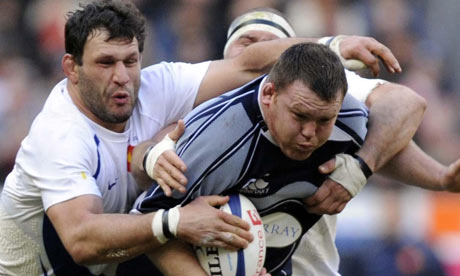
England will lead the opposition when the top nations gather in London this weekend to discuss the experimental law variations, which are currently being trialled on a global basis.
The Rugby Football Union, in conjunction with Premier Rugby, has conducted exhaustive research, into the impact of the variations, analysing every match in the Guinness Premiership this season as well as England's nine internationals. Its conclusion is that, far from having the positive impact that the proponents of the variations predicted, the changes have made the game more defence-oriented with fewer sides willing to take risks and a surfeit of kicking out of hand resulting as a consequence. Referees have also complained that the ELVs have made their job more complicated.
The Six Nations met last week to discuss the variations. England, Wales and Ireland were resolutely opposed to the vast majority of them, Scotland were in support, France equivocated and Italy did not turn up.
The main supporters of the ELVs have been the major southern hemisphere countries, South Africa, New Zealand and Australia, but they had a falling-out in Dubai earlier this month over how the money generated by the Super 14 series and the Tri-Nations should be apportioned. As a consequence, Australia, who have championed the variations with their chief executive, John O'Neill, claiming that rejection of them would cause a split between the hemispheres that could impact on the World Cup, find themselves isolated.
South Africa have never been more than lukewarm about the variations, especially the one that permits the collapsing of mauls, even though they were spawned from a trial at Stellenbosch University, while New Zealand have reached the conclusion that a number will have to be sacrificed in order to save a few when the International Rugby Board's council debates the contentious issue in May.
The IRB is organising the weekend conference in London and it will come armed with statistics about how ball-in-play time has increased since the introduction of the variations and how the game has become more entertaining as a consequence, but any changes will need a 75% majority in May to come into force.
Not all the variations are being trialled globally. The one that sees most offences punished by a free-kick rather than a penalty is being trialled in the Super 14, but not Europe, and even the Australian media has been raging against that in recent weeks, claiming that it has created a cheat's charter, with players wilfully killing the ball in the knowledge that they will not face the sanction of a potential three points against them.
A number of coaches have this year blamed the ELVs for having the opposite effect to that intended. "There is more kicking because there is more risk in running the ball from your own territory," said the Wales assistant coach, Rob Howley. "The loss of the rolling maul has made it difficult to suck in defenders and the overall effect is to make playing for territory paramount."
Italy's coach, Nick Mallett, said the variations were a contributory factor behind his team's whitewash in the Six Nations. "I would change the maul rule," he added. "The game has fewer mauls than before but lots more kicking, stupid kicks, ping-pong, ping-pong. Because teams no longer have to commit to mauls sides find themselves on the break with three attackers against 10 defenders and kick the ball rather than run it. We had a poor Six Nations but the variations hindered us."
One of the few variations to gain a measure of approval in Europe is the one that requires defences to stand five yards back from a scrum, but South Africa's assistant coach, Dick Muir, believes it should go. "Some of the variations are having the opposite effect to that they were meant to," said Muir.

